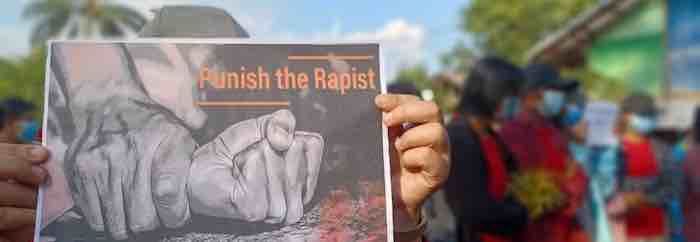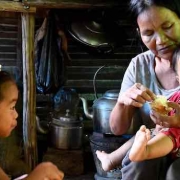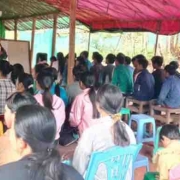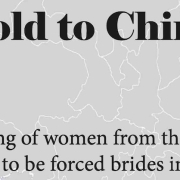Nearly 500 cases of sexual assault against women in Myanmar’s conflict
Rights groups say that the data reflects only cases they have verified and the true number is likely to be much higher.
Nearly 500 cases of sexual assault have been documented against women during Myanmar’s civil war, although the true number is likely much higher, women’s rights groups said Wednesday.
In the aftermath of the military‘s Feb. 1, 2021, coup d’etat, civilians have been caught in the crossfire of battles between the junta and ethnic armies or community-led defense groups.
On Wednesday, Thailand‘s Women’s League of Burma, or WLB, said that women have endured some of the worst treatment since the takeover, including arrest, torture, sexual assault and even murder.
“Incidents of sexual violence are also on the rise, with women being abused in front of their husbands and family members — situations marked by extreme inhumanity,” said WLB Secretary General Moon Nay Li. “Some women are gang-raped by soldiers, while others are killed.”
The WLB said that between Feb. 1, 2021, and June 2024, it had documented 492 cases of sexual assault against women, including at least 13 cases where women were raped and then killed.
It said that its data reflect only the cases the group was able to verify and that the true numbers are likely to be much higher — potentially twice the rate reported prior to the coup.
WLB‘s report came weeks after a column of more than 100 junta soldiers attacked villages in war-torn Sagaing region’s Budalin township on Oct. 23, including Sai Pyin Lay village, where more than 50 young female hostages were allegedly sexually assaulted over the course of three days, according to a source familiar with the incident.
“During those three days, the soldiers summoned each woman repeatedly, subjecting them to rape and sexual assault,” the source told RFA Burmese, adding that the alleged perpetrators were soldiers from the junta’s No.33 and No.77 Light Infantry Divisions.
Zu Zu May Yoon, the founder of the Women’s Organization of Political Prisoners, told RFA that women arrested for protesting the coup have also faced sexual assault during interrogation.
“In interrogation centers, women are subjected to severe abuse, including being penetrated with batons in their private areas,” he said. “During interrogations, junta authorities reportedly burn pens with matches to release scalding ink and then apply it to these areas. Such acts reflect the extreme brutality of the military.”
Women who are assaulted rarely report the abuse due to shame and various threats, he added.
As a result, some women suffering from severe physical and mental trauma ultimately feel forced to flee their communities for safety elsewhere.
RFA has been unable to independently verify reports of sexual assaults by the military. Attempts to reach Major General Zaw Min Tun, the military junta’s authorized spokesperson, for comment went unanswered Wednesday.
Civilians and People’s Defense Forces
A resident of Sagaing told RFA that the junta has “increasingly targeted women” in the region with “threats, rape and killings.”
“Women face daily intimidation, and in Sagaing, numerous cases of rape have been reported since the [conflict] began, averaging at least one incident per month,” said the resident who, like others interviewed for this report, spoke on condition of anonymity due to security concerns.
But sources in the region told RFA that it isn’t just junta soldiers who are committing crimes against women.
In August, a 14-year-old student was raped by a resident of Sagaing’s Yinmarbin township, according to a family member of the victim who said that while a case was filed with authorities, the perpetrator has yet to face punishment.
“In terms of law enforcement, I must say that it is very weak,” said the family member, who also declined to be named. “The incident took place two months ago, but hasn’t been prosecuted or brought before the Department of Justice. Victims of these crimes are like orphans, unsure of who to turn to for help.”
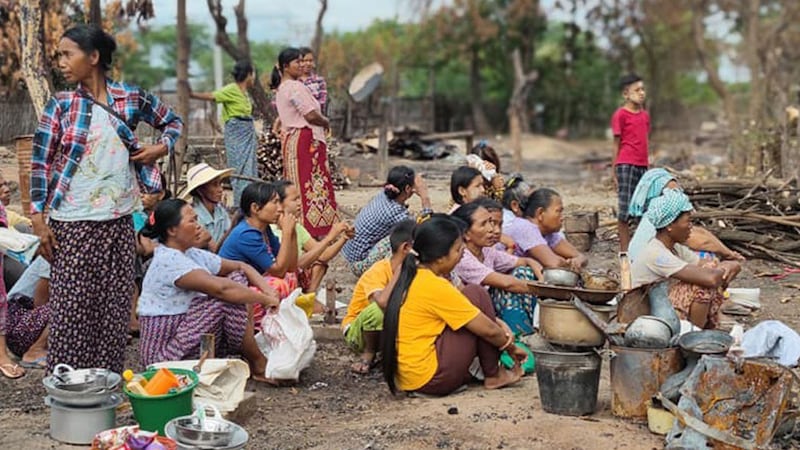
According to a list compiled by the Ministry of Women, Youth and Children Affairs of the shadow National Unity Government, or NUG, there have been 258 reported cases of sexual assault against women since the coup, with more than half of them committed by junta troops.
“Of the 258 reported cases, 148 were committed by the military junta’s troops,” said NUG Minister Naw Susanna Hla Hla Soe. “We have meticulously documented these cases and are collaborating with the United Nations to ensure justice. The remaining cases include 89 committed by civilians and 33 by [armed opposition groups].”
The minister added that in cases where members of the People‘s Defense Force of civilian paramilitary groups aligned against the junta under the shadow government are responsible, the NUG’s Ministry of Defense “will take action under martial law,” while crimes committed by civilians will be addressed under civil law.
However, she acknowledged that in some areas controlled by the armed opposition, instability has “led to delays in the legal process.”
Non-conflict abuse
Meanwhile, women’s rights groups warned that the threats faced by women are a concern “not only in war zones,” but also in non-conflict areas, and that “perpetrators must be prosecuted and held accountable.”
Last month, international labor group the Business and Human Rights Resource Center said in a report that abuse against women is far from rare in Myanmar’s manufacturing sector, as a deteriorating economy leaves them more vulnerable to sexual exploitation, abuse and violence.
The group documented 155 cases of abuse in Myanmar factories, linked to 87 international companies, between Dec. 1, 2023, and June 30, 2024, with 37% of them gender-based incidents including “verbal, physical and sexual abuse and harassment, often for not meeting unreasonable production targets.”
An economy in free-fall since the military ousted an elected government has exacerbated the problem of exploitation for many in Myanmar as factory owners and supervisors know that employees are increasingly desperate for cash as inflation erodes living standards, labor activists told RFA.
At least 1,853 people have died in military custody, including 88 children and 125 women, since Myanmar’s military coup – many after being tortured – a U.N. report on the situation of human rights in the country said in September.
Sexual violence is also common in detention, the U.N. report said, “including rape, and sexualized torture or ill-treatment, including forced nudity in front of others.”

